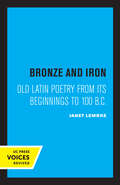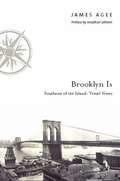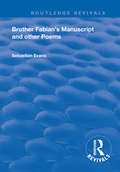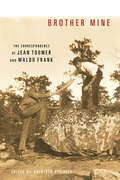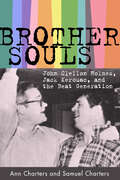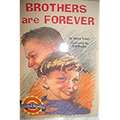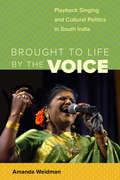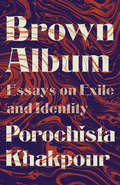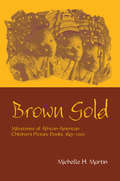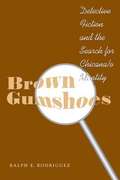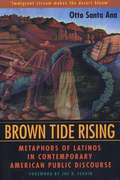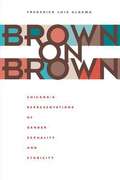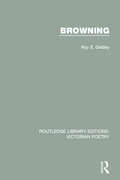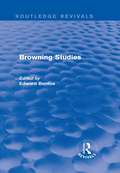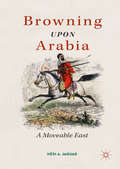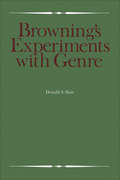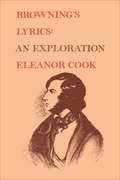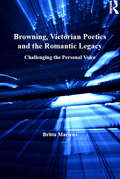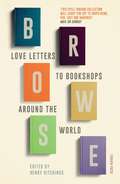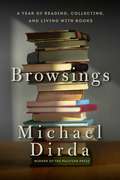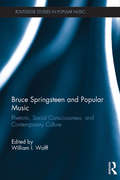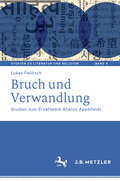- Table View
- List View
Bronze and Iron: Old Latin Poetry from Its Beginnings to 100 B.C.
by Janet LembkeThis title is part of UC Press's Voices Revived program, which commemorates University of California Press’s mission to seek out and cultivate the brightest minds and give them voice, reach, and impact. Drawing on a backlist dating to 1893, Voices Revived makes high-quality, peer-reviewed scholarship accessible once again using print-on-demand technology. This title was originally published in 1973.
Brooklyn Is -- Southeast of the Island: Travel Notes
by James Agee Jonathan LethemIn 1939, James Agee was working for Fortune magazine. Commissioned to write an article on Brooklyn for a special issue on New York, Agee moved to the Flatbush neighborhood for two months, later producing "Southeast of the Island: Travel Notes". As had earlier happened with the essay that was to become his classic portrait of southern farmers, "Let Us Now Praise Famous Men", Fortune declined to publish, and the essay remained unpublished until its 1968 Esquire appearance under the title "Brooklyn Is". In the words of Brooklyn-born novelist Jonathan Lethem, who provides the introduction to the essay in this volume, "the narrative rises up on the swirling imaged-junked cone of Agee's prophetic style to see the borough and its people whole".
Brother Fabian's Manuscript: And Other Poems (Routledge Revivals)
by Sebastian EvansOriginally published in 1984, Brother Fabian's Manuscript and Other Poems includes Brother Fabian's Manuscript and thirty-four additional poems.
Brother Mine: The Correspondence of Jean Toomer and Waldo Frank
by Jean Toomer Waldo FrankThe friendship of Jean Toomer and Waldo Frank was one of the most emotionally intense, racially complicated, and aesthetically significant relationships in the history of American literary modernism. Waldo Frank was an established white writer who advised and assisted the younger African American Jean Toomer as he pursued a literary career. They met in 1920, began corresponding regularly in 1922, and were estranged by the end of 1923, the same year that Toomer published his ambitiously modernist debut novel, Cane. While individual letters between Frank and Toomer have been published separately on occasion, they have always been presented out of context. This volume presents for the first time their entire correspondence in chronological order, comprising 121 letters ranging from 200 to 800 words each. Kathleen Pfeiffer annotates and introduces the letters, framing the correspondence and explaining the literary and historical allusions in the letters themselves. Reading like an epistolary novel, Brother Mine captures the sheer emotional force of the story that unfolds in these letters: two men discover an extraordinary friendship, and their intellectual and emotional intimacy takes shape before our eyes. This unprecedented collection preserves the raw honesty of their exchanges, together with the developing drama of their ambition, their disappointments, their assessment of their world, and ultimately, the betrayal that ended the friendship.
Brother-Souls: John Clellon Holmes, Jack Kerouac, and the Beat Generation
by Ann Charters Samuel ChartersJohn Clellon Holmes met Jack Kerouac on a hot New York City weekend in 1948, and until the end of Kerouac’s life they were—in Holmes’s words—“Brother Souls.” Both were neophyte novelists, hungry for literary fame but just as hungry to find a new way of responding to their experiences in a postwar American society that for them had lost its direction. Late one night as they sat talking, Kerouac spontaneously created the term “Beat Generation” to describe this new attitude they felt stirring around them. Brother-Souls: John Clellon Holmes, Jack Kerouac, and the Beat Generation is the remarkable chronicle of this cornerstone friendship and the life of John Clellon Holmes. From 1948 to 1951, when Kerouac’s wanderings took him back to New York, he and Holmes met almost daily. Struggling to find a form for the novel he intended to write, Kerouac climbed the stairs to the apartment in midtown Manhattan where Holmes lived with his wife to read the pages of Holmes’s manuscript for the novel Go as they left the typewriter. With the pages of Holmes’s final chapter still in his mind, he was at last able to crack his own writing dilemma. In a burst of creation in April 1951, he drew all the materials he had been gathering into the scroll manuscript of On the Road. Biographer Ann Charters was close to John Clellon Holmes for more than a decade. At his death in 1988 she was one of a handful of scholars allowed access to the voluminous archive of letters, journals, and manuscripts Holmes had been keeping for twenty-five years. In that mass of material waited an untold story. These two ambitious writers, Holmes and Kerouac, shared days and nights arguing over what writing should be, wandering from one explosive party to the next, and hanging on the new sounds of bebop. Through the pages of Holmes’s journals, often written the morning after the events they recount, Charters discovered and mined an unparalleled trove describing the seminal figures of the Beat Generation: Holmes, Kerouac, Neal Cassady, Allen Ginsberg, William Burroughs, Gregory Corso, and their friends and lovers.
Brothers of the Quill: Oliver Goldsmith in Grub Street
by Norma ClarkeOliver Goldsmith arrived in England a penniless Irishman and toiled for years in the anonymity of Grub Street. Norma Clarke tells how this destitute scribbler became one of literary London's most celebrated authors, transmuting dark truths about the empire into fable and nostalgia whose undertow of Irish indignation remains just barely perceptible.
Brought to Life by the Voice: Playback Singing and Cultural Politics in South India (South Asia Across the Disciplines)
by Amanda WeidmanTo produce the song sequences that are central to Indian popular cinema, singers’ voices are first recorded in the studio and then played back on the set to be lip-synced and danced to by actors and actresses as the visuals are filmed. Since the 1950s, playback singers have become revered celebrities in their own right. Brought to Life by the Voice explores the distinctive aesthetics and affective power generated by this division of labor between onscreen body and offscreen voice in South Indian Tamil cinema. In Amanda Weidman’s historical and ethnographic account, playback is not just a cinematic technique, but a powerful and ubiquitous element of aural public culture that has shaped the complex dynamics of postcolonial gendered subjectivity, politicized ethnolinguistic identity, and neoliberal transformation in South India.
Brouhaha: Worlds of the Contemporary (Univocal)
by Raymond N. MacKenzie Lionel RuffelWithin the hypermediated age where knowledge production is decentered and horizontal, the experience of lived time has become a concordance of temporalities. The literary imagination, which was emblematic of modernity and thoroughly connected to the book as a support structure, has now become integrated within a much vaster regime of publication. Thought concerning the world is from now on a thought concerning a plurality of worlds. By way of six guiding threads (exposition, media, controversy, publication, institutionalization, archaeology), this essay describes the transformation of cultural forms and visions of history.
Brown Album: Essays on Exile and Identity
by Porochista Khakpour*A Vintage Original*From the much-acclaimed novelist and essayist, a beautifully rendered, poignant collection of personal essays, chronicling immigrant and Iranian-American life in our contemporary moment.Novelist Porochista Khakpour's family moved to Los Angeles after fleeing the Iranian Revolution, giving up their successes only to be greeted by an alienating culture. Growing up as an immigrant in America means that one has to make one's way through a confusing tangle of conflicting cultures and expectations. And Porochista is pulled between the glitzy culture of Tehrangeles, an enclave of wealthy Iranians and Persians in LA, her own family's modest life and culture, and becoming an assimilated American. Porochista rebels--she bleaches her hair and flees to the East Coast, where she finds her community: other people writing and thinking at the fringes. But, 9/11 happens and with horror, Porochista watches from her apartment window as the towers fall. Extremism and fear of the Middle East rises in the aftermath and then again with the election of Donald Trump. Porochista is forced to finally grapple with what it means to be Middle-Eastern and Iranian, an immigrant, and a refugee in our country today. Brown Album is a stirring collection of essays, at times humorous and at times profound, drawn from more than a decade of Porochista's work and with new material included. Altogether, it reveals the tolls that immigrant life in this country can take on a person and the joys that life can give.
Brown Gold: Milestones of African American Children's Picture Books, 1845-2002 (Children's Literature and Culture #Vol. 30)
by Michelle MartinBrown Gold is a compelling history and analysis of African-American children's picturebooks from the mid-nineteenth century to the present. At the turn of the nineteenth century, good children's books about black life were hard to find — if, indeed, young black readers and their parents could even gain entry into the bookstores and libraries. But today, in the "Golden Age" of African-American children's picturebooks, one can find a wealth of titles ranging from Happy to be Nappy to Black is Brown is Tan. In this book, Michelle Martin explores how the genre has evolved from problematic early works such as Epaminondas that were rooted in minstrelsy and stereotype, through the civil rights movement, and onward to contemporary celebrations of blackness. She demonstrates the cultural importance of contemporary favorites through keen historical analysis — scrutinizing the longevity and proliferation of the Coontown series and Ten Little Niggers books, for example — that makes clear how few picturebooks existed in which black children could see themselves and their people positively represented even up until the 1960s. Martin also explores how children's authors and illustrators have addressed major issues in black life and history including racism, the civil rights movement, black feminism, major historical figures, religion, and slavery. Brown Gold adds new depth to the reader's understanding of African-American literature and culture, and illuminates how the round, dynamic characters in these children's novels, novellas, and picturebooks can put a face on the past, a face with which many contemporary readers can identify.
Brown Gumshoes: Detective Fiction and the Search for Chicana/o Identity
by Rodriguez Ralph E.In this book, the first comprehensive study of Chicano/a detective fiction, Ralph E. Rodriguez examines the recent contributions to the genre by writers such as Rudolfo Anaya, Lucha Corpi, Rolando Hinojosa, Michael Nava, and Manuel Ramos. Their works reveal the struggles of Chicanas/os with feminism, homosexuality, familia, masculinity, mysticism, the nationalist subject, and U.S.-Mexico border relations. He maintains that their novels register crucial new discourses of identity, politics, and cultural citizenship that cannot be understood apart from the historical instability following the demise of the nationalist politics of the Chicana/o movement of the 1960s and 1970s. In contrast to that time, when Chicanas/os sought a unified Chicano identity in order to effect social change, the 1980s, 1990s, and 2000s have seen a disengagement from these nationalist politics and a new trend toward a heterogeneous sense of self. The detective novel and its traditional focus on questions of knowledge and identity turned out to be the perfect medium in which to examine this new self.
Brown Tide Rising: Metaphors of Latinos in Contemporary American Public Discourse
by Santa Ana OttoHe convincingly demonstrates that three anti-Latino referenda passed in California because of such imagery, particularly the infamous anti-immigrant measure, Proposition 187. Santa Ana illustrates how Proposition 209 organizers broadcast compelling new metaphors about racism to persuade an electorate that had previously supported affirmative action to ban it. He also shows how Proposition 227 supporters used antiquated metaphors for learning, school, and language to blame Latino children's speech—rather than gross structural inequity—for their schools' failure to educate them. Santa Ana concludes by calling for the creation of insurgent metaphors to contest oppressive U.S. public discourse about minority communities.
Brown on Brown: Chicano/a Representations of Gender, Sexuality, and Ethnicity
by Aldama Frederick LuisIn this book, Frederick Luis Aldama follows an entirely different approach. He investigates the ways in which race and gay/lesbian sexuality intersect and operate in Chicano/a literature and film while taking into full account their imaginative nature and therefore the specific kind of work invested in them. Also, Aldama frames his analyses within today's larger (globalized) context of postcolonial literary and filmic canons that seek to normalize heterosexual identity and experience. Throughout the book, Aldama applies his innovative approach to throw new light on the work of authors Arturo Islas, Richard Rodriguez, John Rechy, Ana Castillo, and Sheila Ortiz Taylor, as well as that of film director Edward James Olmos. In doing so, Aldama aims to integrate and deepen Chicano literary and filmic studies within a comparative perspective. Aldama's unusual juxtapositions of narrative materials and cultural personae, and his premise that literature and film produce fictional examples of a social and historical reality concerned with ethnic and sexual issues largely unresolved, make this book relevant to a wide range of readers.
Browning (Routledge Library Editions: Victorian Poetry #2)
by Roy E. GridleyFirst published in 1972. Browning was a keen observer and dramatic recorder of nineteenth-century European culture; his poetry reflects a wide range of intellectual, religious and artistic issues of his day. Roy E. Gridley shows here that during the six decades of Browning’s active writing career (1832-89), his poetry is a record and an interpretation of the changing modes of thought, feeling and expression of nineteenth-century life. Browning was a ‘romantic’ who, by virtue of his realistic and often revolutionary poetry, became a ‘modern’, and had considerable influence on writers such as Yeats, Eliot and Pound. While surveying the whole of Browning’s life and work, Gridley focuses closely on the more famous poems, examining them as documents that give the general reader a deeper appreciation of the richness and diversity of life in Victorian Europe.
Browning Studies: Being Select Papers by Members of the Browning Society (Routledge Revivals)
by Edward BerdoeThis title, first published in 1909, presents a selection of the most important essays by members of the renowned Browning Society, which existed to promulgate the works of and appreciation for perhaps the greatest English poet of the Victorian Age. Browning’s poetry deals with themes that are of perennial importance: the nature of the human person, human love, and the source of the love, God. Browning Studies will appeal to Browning enthusiasts and the message his writing communicates: "A profound, passionate, living, triumphant faith in Christ, and in the immortality and ultimate redemption of every human soul in and through Christ."
Browning Upon Arabia: A Moveable East
by Hédi A. JaouadBrowning Upon Arabia charts Robert Browning’s early and enduring engagement with the East, particularly the Arab East. This book highlights the complexities of Browning’s poetry, revealing Browning’s resistance to triumphalist and imperialist forms of Orientalism generated by many nineteenth-century British and European literary and scholarly portrayals of the East. Hédi A. Jaouad argues that Browning extensively researched the literature, history, philosophy, and culture of the East to produce poetry that is sensitive to its Eastern resources and devoted to confirming the interrelation of Northern and Eastern knowledge in pursuit of a new form of transcendental humanism.
Browning's Experiments with Genre
by Donald HairOne of the chief characteristics of nineteenth-century poetics was a tendency to test the conventions and techniques of literary genres by shifting, modifying, and combining various styles and forms. Browning fully exploited these changes, because his interests and purposes as a poet seemed to demand more of the lyric, the dramatic, and the narrative than these kinds had traditionally been able to perform. His fascination was with the development of the individual soul and he was determined to evoke in his readers his own insights into the complexity of human concerns; thus he became a constant experimenter with genre. Browning never felt that any experiment, however unsatisfactory the result, was wasted effort; each direction tried made him better prepared to attempt another. This book explores the kinds and modes with which he worked and describes the nature of the experiments he made, concentrating on the earlier poetry and in particular on The Ring and the Book. Professor Hair is sensitive to Browning's work, and his criticism is a model of understanding, warm appreciation, and critical good sense.
Browning's Lyrics: An Exploration
by Eleanor CookBrowning's lyrics are favourite choices for anthologies but are rarely examined closely. This is the first full-length study of the lyrics, and includes detailed analyses of such well-known poems as Love Among the Ruins, Two in the Campagna, A Serenade at the Villa, A Toccata of Galuppi's, By the Fireside, and James Lee's Wife. Eleanor Cook explores Browning's use of repeated images and themes in the lyrics, examines these patterns in other poems and in his letters, and analyses their growth and change in all his work. She demonstrates how the lyrics may be linked with Browning's other work and shows something of his essential artistic unity. His imaginary is found to be more consistent and complex than is usually assumed.Students of Browning will find this work stimulating and instructive, while lovers of Browning will read it with pure pleasure. The reader will return to many of the poems with a rciher sense of their continuing vitality. In an earlier form this study was awarded the first A.S.P. Woodhouse Prize by the University of Toronto.
Browning, Victorian Poetics and the Romantic Legacy: Challenging the Personal Voice (Ashgate Popular And Folk Music Ser.)
by Britta MartensTaking an original approach to Robert Browning's poetics, Britta Martens focuses on a corpus of relatively neglected poems in Browning's own voice in which he reflects on his poetry, his self-conceptualization and his place in the poetic tradition. She analyzes his work in relation to Romanticism, Victorian reactions to the Romantic legacy, and wider nineteenth-century changes in poetic taste, to argue that in these poems, as in his more frequently studied dramatic monologues, Browning deploys varied dramatic methods of self-representation, often critically and ironically exposing the biases and limitations of the seemingly authoritative speaker 'Browning'. The poems thus become devices for Browning's detached evaluation of his own and of others' poetics, an evaluation never fully explicit but presented with elusive economy for the astute reader to interpret. The confrontation between the personal authorial voice and the dramatic voice in these poems provides revealing insights into the poet's highly self-conscious, conflicted and sustained engagement with the Romantic tradition and the diversely challenging reader expectations that he faces in a post-Romantic age. As the Victorian most rigorous in his rejection of Romantic self-expression, Browning is a key transitional figure between the sharply antagonistic periods of Romanticism and Modernism. He is also, as Martens persuasively demonstrates, a poet of complex contradictions and an illuminating case study for addressing the perennial issues of voice, authorial authority and self-reference.
Browse: The World in Bookshops
by Various Henry HitchingsA celebration of the greatest kind of shop in the world, by an award-winning cast of writers including Ali Smith, Michael Dirda, Elif Shafak and Daniel Kehlmann. A cabinet of curiosities, a time machine, a treasure trove - we love bookshops because they possess a unique kind of magic. In Browse, Henry Hitchings asks fifteen writers from around the world to reveal their favourite bookshops, each conjuring a specific time and place. These inquisitive, enchanting pieces are a collective celebration of bookshops - for anyone who has ever fallen under their spell. Contributors include Alaa Al Aswany, Stefano Benni, Michael Dirda, Daniel Kehlmann, Andrey Kurkov, Yiyun Li, Pankaj Mishra, Dorthe Nors, Yvonne Adhiambo Owuor, Elif Shafak, Ian Sansom, Iain Sinclair, Ali Smith, Saša Stanišic, and Juan Gabriel Vásquez.A dazzling collection of original essays about the bookshop by fifteen bestselling international authors.
Browsings: A Year of Reading, Collecting, and Living with Books
by Michael DirdaFrom Pulitzer Prize-winning book critic Michael Dirda comes a collection of his most personal and engaging essays on the literary life--the perfect companion for any lover of books. Michael Dirda has been hailed as "the best-read person in America" (The Paris Review) and "the best book critic in America" (The New York Observer). In addition to the Pulitzer Prize he was awarded for his reviews in The Washington Post, he picked up an Edgar from the Mystery Writers of America for his most recent book, On Conan Doyle. Dirda's latest volume collects fifty of his witty and wide-ranging reflections on literary journalism, book collecting, and the writers he loves. Reaching from the classics to the post-moderns, his allusions dance from Samuel Johnson, Ralph Waldo Emerson and M. F. K. Fisher to Marilynne Robinson, Hunter S. Thompson, and David Foster Wallace. Dirda's topics are equally diverse: literary pets, the lost art of cursive writing, book inscriptions, the pleasures of science fiction conventions, author photographs, novelists in old age, Oberlin College, a year in Marseille, writer's block, and much more, not to overlook a few rants about Washington life and American culture. As admirers of his earlier books will expect, there are annotated lists galore--of perfect book titles, great adventure novels, favorite words, essential books about books, and beloved children's classics, as well as a revealing peek at the titles Michael keeps on his own nightstand. Funny and erudite, occasionally poignant or angry, Browsings is a celebration of the reading life, a fan's notes, and the perfect gift for any booklover.
Bruce McDonald's 'Hard Core Logo'
by Paul McewanConsistently ranked as one of the best Canadian movies of all time, punk-rock mockumentary Hard Core Logo (1996) documents the last-ditch reunion tour of an aging rock band led by vocalist Joe Dick (Hugh Dillon). Well received by critics at the time of its release, the film continues to enjoy a devoted international cult following.This entertaining analysis of Hard Core Logo explores many of the film's key themes, including the responsibility of documentary filmmakers to their subjects, the development of close male relationships, and the relationship between art and commerce in Canada, especially for touring musicians. Paul McEwan examines Hard Core Logo in the context of other adaptations of Michael Turner's 1993 novel of the same name, as well as against other films from McDonald's celebrated career. Featuring interviews with McDonald himself and others involved in the film, Bruce McDonald's 'Hard Core Logo' provides an engaging look at one of Canada's most mythologized movies.
Bruce Springsteen and Popular Music: Rhetoric, Social Consciousness, and Contemporary Culture (Routledge Studies in Popular Music)
by William WolffThis interdisciplinary volume enters the scholarly conversation about Bruce Springsteen at the moment when he has reinforced his status of global superstar and achieved the status of social critic. Covering musical and cultural developments, chapters primarily consider work Springsteen has released since 9/11—that is, released during a period of continued global unrest, economic upheaval, and social change—under the headings Politics, Fear and Society; Gender and Sexual Identity; and Toward a Rhetoric of Springsteen. The collection engages Springsteen and popular music as his contemporary work is just beginning to be understood in terms of its impact on popular culture and music, applying new areas of inquiry to Springsteen and putting Springsteen fan writing within the same binding as academic writing to show how together they create a more nuanced understanding of an artist. Established and emerging Springsteen scholars approach work from disciplines including rhetoric and composition, historical musicology, labor studies, American history, literature, communications, sociology, theology, and government. Offering context, critique, and expansive understanding of Springsteen and his work, this book contributes to Springsteen scholarship and the study of popular music by showing Springsteen’s broadening academic appeal as well as his escalating legacy on new musicians, social consciousness, and contemporary culture.
Bruch und Verwandlung: Studien zum Erzählwerk Aharon Appelfelds (Studien zu Literatur und Religion / Studies on Literature and Religion #9)
by Lukas PallitschDie vorliegende Arbeit nimmt ihren Ausgangspunkt beim Erzählwerk des israelischen Schriftstellers Aharon Appelfeld (1932-2018), in dessen Zentrum die Figur des flüchtenden Überlebenden steht. Entgegen der bisherigen Tendenz, Appelfelds Romane autobiographisch und fast ausschließlich vor dem Hintergrund der Schoa zu lesen, wird das Werk in einer dreifachen Weise hinsichtlich Raum, Zeit und Erzählform perspektiviert. Das bedeutet zugleich, die Erzähltexte in einen erzähltheoretischen, biblischen und theologischen Kontext zu rücken, der helfen kann, einen tieferen Aufschluss über die Verwobenheit von Religion und Literatur zu geben, die in diesem Fall im Narrativ des Exodus kulminiert.
